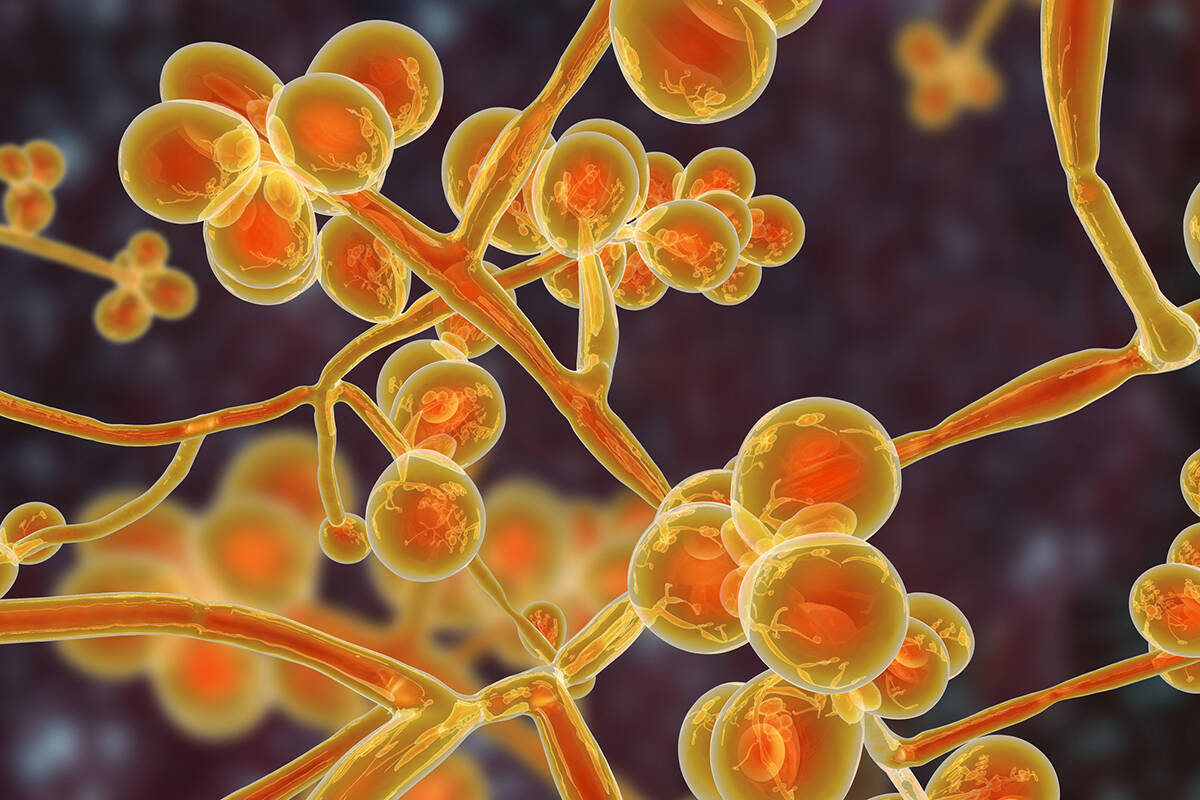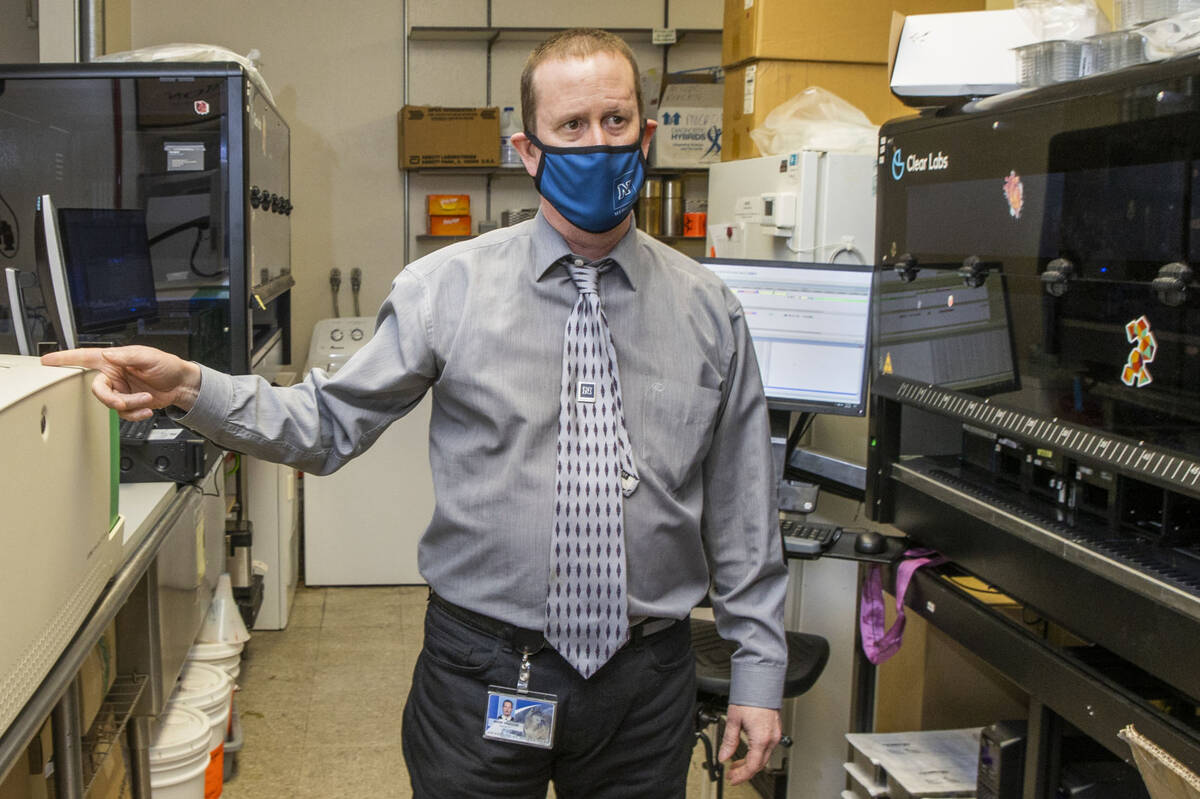‘Superbug’ outbreaks reported at Nevada hospitals, nursing facilities
State and federal health authorities are investigating ongoing outbreaks at Nevada hospitals and nursing homes of a drug-resistant “superbug” that can lead to serious illness and even death.
As of mid-April, the Nevada Department of Health and Human Services has been investigating outbreaks of a fungus called Candida auris at acute-care hospitals, long-term acute-care hospitals and skilled nursing facilities, according to a technical bulletin sent by the state to health care providers.
The bulletin, which advises health care facilities to take special infection control and prevention precautions, does not state where the outbreaks have occurred, how many patients have been affected or whether any of the cases were fatal. However, some Southern Nevada hospitals confirmed they had identified recent cases.
Mark Pandori, director of the Nevada State Public Health Laboratory, said that the vast majority of cases the lab has analyzed have been from Southern Nevada. Several health care facilities have been affected, he said.
Candida auris, first identified in Japan in 2009, is a serious global health threat, according to the Centers for Disease Control and Prevention. Once rare, the infection has become more common and is often resistant to multiple drugs typically used to treat Candida infections. Some of its strains are resistant to all types of antifungals.
Test specimens genetically analyzed in the state lab indicate that Nevada’s cases for the most part respond to one drug, Pandori said. Analysis also indicates that there have been several introductions of the fungus into the community, rather than it spreading from a single source.
Pandori referred additional questions about the outbreaks to the state health department, which failed to provide comment by Tuesday night.
A CDC representative said the federal agency is “supporting local health officials in Nevada in response to an ongoing outbreak of Candida auris across several healthcare facilities.”
“CDC experts are assisting with identifying additional cases, assessing facility infection control practices, and ensuring staff are educated on C. auris and its prevention strategies,” representative Belsie González said in an email.
“C. auris is an emerging, often multidrug-resistant yeast that is highly transmissible and results in outbreaks in healthcare settings, often in long-term care facilities,” González said in the email. “C. auris can persist on patients and in the environment for weeks and can spread among patients through contact with contaminated surfaces.”
Some people carry the fungus on their skin without showing signs of infection, but with the potential of spreading it to others, according to the CDC’s website.
Hospitals confirm cases
University Medical Center, the county’s public hospital, said it had identified a “cluster” of cases.
“Much like other acute care hospitals in Las Vegas, and across the country, UMC’s infectious disease specialists have identified a cluster of Candida auris and are expertly guiding our clinicians through the necessary infection control procedures to maintain the health and safety of our patients and caregivers,” representative Danita Cohen said in an email.
Sunrise Health System “continues to work with the Nevada Department of Health and Human Services and the CDC on understanding and addressing this emerging disease across Las Vegas healthcare settings,” said representative Antonio Castelan. The Sunrise system includes MountainView, Southern Hills and Sunrise hospitals.
“We will continue to monitor, and work with all agencies to keep our patients safe,” said Castelan, who said the Sunrise system was not releasing the number of cases it had identified.
St. Rose Dominican has identified one recent case across its three hospitals, representative Gordon Absher said. The patient was treated and discharged from its Siena campus in mid-March.
“Our health care professionals remain in contact with local health officials and the CDC and are prepared to treat and manage any cases we may encounter,” Absher said in an email.
Valley Health System hospitals “are aware of the situation and are taking all necessary precautions,” said representative Gretchen Papez. She did not say whether her system – Centennial Hills, Desert Springs, Henderson, Spring Valley, Summerlin and Valley hospitals — had identified any cases.
COVID-19 linked to infections
C. auris can cause bloodstream infections and even death, particularly in hospital and nursing home patients with serious medical problems. More than 1 in 3 patients die who have an invasive C. auris infection, such as one affecting the blood, heart or brain, according to the CDC.
The most common symptoms of an invasive infection are fever and chills that don’t improve after antibiotic treatment for a suspected bacterial infection. A C. auris infection can be difficult to identify with standard laboratory methods, and it can be misidentified in labs without specific technology, according to the bulletin from the state.
In 2021, there were nearly 1,300 reported confirmed or probable cases of C. auris, according to CDC data, with cases in the low triple figures in California, Florida, Illinois and New York. Nevada had just two reported cases last year.
The pandemic fostered certain conditions that made its spread more likely, with outbreaks occurring in COVID-19 units of acute care hospitals, the CDC said. These outbreaks may be related to changes in routine infection control practices, including limited availability of gloves and gowns, reuse or extended use of these items, and changes in cleaning and disinfection practices.
Contact Mary Hynes at mhynes@reviewjournal.com or 702-383-0336. Follow @MaryHynes1 on Twitter.




















